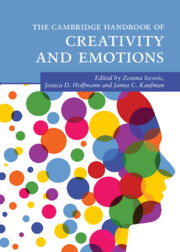‘This handbook is a must read to anyone seeking the most comprehensive reference to date on the topic of creativity and emotions. It offers an outstanding coverage of the key issues on the topic, and a stunning demonstration of the complementarity of perspectives, by leaders in this field.’
Baptiste Barbot - Université Catholique de Louvain, Belgium
‘A creative process is an emotional roller-coaster. The Cambridge Handbook of Creativity and Emotions will take you on a long ride through the scientific study of creative persons in several contexts, including school and work, while contemplating their related affective, emotional and motivational states and abilities. Enjoy the ride!’
Giovanni Emanuele Corazza - University of Bologna, Italy
‘Like all good handbooks, The Cambridge Handbook of Creativity and Emotions pulls together world-class researchers who are at the cutting edge of a field of study (creativity and emotion) that is lacking a high-level summary of what the field is about and why it is important. This book fills that void.’
Gregory J. Feist - San Jose State University, USA
‘A delightful read for anyone interested in uncovering a different and often overlooked side of creativity - its deep connection to emotion and to human ways of experiencing the world. Comprehensive in its coverage and accessible in its approach, this handbook is set to become an essential resource for creativity and emotion researchers alike.’
Vlad P. Glaveanu - Webster University Geneva, Switzerland and University of Bergen, Norway
‘Emotions offer an essential key to unlock the mysteries of creativity. This handbook provides an up-to-date view, examining person-centered, process-centered, developmental, and methodological issues in a wide range of contexts. For a 360-degree vantage point on the emotion-creativity connection, this Handbook is a must see.’
Todd Lubart - Professor of Psychology, Université Paris Cité, France and President of ISSCI, International Society for the Study of Creativity and Innovation
‘The conventional wisdom is that the important topic of affect and creativity is understudied. This Handbook provides convincing evidence the conventional wisdom as it involves emotion and creativity is not only wrong, but wildly so. Both basic and applied creativity research involving emotion is thriving, and the handbook’s impressive mix of scholars and practitioners from around the world provide insights about studying emotions and creativity, how emotions influence the creativity process across several domains, and how emotions interact with other affective constructs to influence and be influenced by creativity, among many other topics. Anyone studying emotions and creativity or applying this research to practice should keep this handbook within easy reach.’
Jonathan A. Plucker - Julian C. Stanley Professor of Talent Development, John Hopkins University, USA
‘For decades, investigators have explored the connection between emotional experience and creativity. How do our emotions inform the creative process? How do they help us to appreciate others’ creativity? In the first and only handbook of its kind, Ivcevic, Hoffman, and Kaufman have collected together well-rendered essays addressing these and other questions from fields as diverse as affective neuroscience, child development, and personality psychology. An excellent resource!’
Peter Salovey - Chris Argyris Professor of Psychology and President of Yale University, Yale University, USA
‘This handbook brings together the leading scholars worldwide on the study of the relationship between creativity and emotions. It is written in a way that researchers not only in psychology, but in other fields studying creativity, can understand. It brilliantly covers the gamut of topics in this field, and masterfully presents information about creativity and emotion that will make it an indispensable guide to anyone who wants to understand why they, or others, can feel so very creative one day and yet barren of creative ideas the next.’
Robert J. Sternberg - Professor, Cornell University, USA and University of Heidelberg, Germany
‘Even readers who consider themselves familiar with the creativity literature will find hitherto overlooked materials in this compendium, and those who are well read on the topic of emotions will discover material to broaden and deepen their knowledge.’
S. Krippner
Source: Choice





